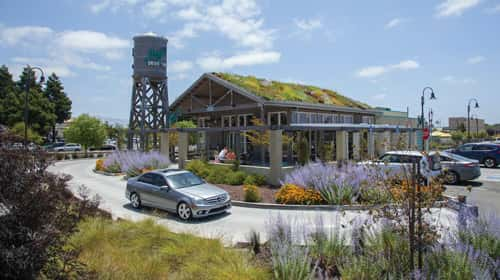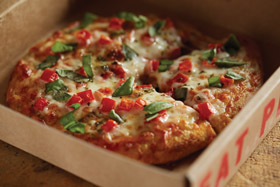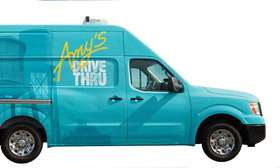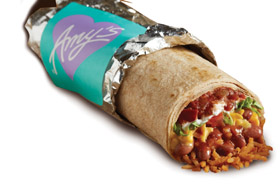
Fast food is synonymous with greasy, unhealthy, fat and sodium-laden food, but Petaluma-based Amy’s Kitchen is aiming to change that perception single-handedly with “healthy fast food.” Though it may be an oxymoron, healthy fast food is quickly serving the likes of consumers, and Amy’s Drive Thru in Rohnert Park is the shining light in the dark vast sea of national-chain fast food competitors. And if one company can change an industry, Amy’s can.
Filling the niche
 Amy’s founders Andy and Rachel Berline had their first Aha moment in 1987 while Rachel was pregnant with their daughter, Amy, (after whom the company is named) and was on bed rest. Wanting to find some quick and easy convenience meals at the local natural grocery store, Andy came back empty-handed after finding nothing organic or vegetarian that looked tasty. They realized there was a real shortage of healthy, convenience meals in the food industry and decided to start their own company to fill the niche. Their goal was to produce healthy, vegetarian convenience foods that were delicious and allowed people to have the ease of a frozen dish without compromising taste or their health.
Amy’s founders Andy and Rachel Berline had their first Aha moment in 1987 while Rachel was pregnant with their daughter, Amy, (after whom the company is named) and was on bed rest. Wanting to find some quick and easy convenience meals at the local natural grocery store, Andy came back empty-handed after finding nothing organic or vegetarian that looked tasty. They realized there was a real shortage of healthy, convenience meals in the food industry and decided to start their own company to fill the niche. Their goal was to produce healthy, vegetarian convenience foods that were delicious and allowed people to have the ease of a frozen dish without compromising taste or their health.
Andy and Rachel first created a handmade pot pie which they sold locally. Once popularity grew for their potpies, customers started asking for other products and the company took off. Burritos and mac and cheese came next, followed by veggie burgers, pizza and enchiladas. A little more than 10 years later the line-up expanded even more to include soups, beans and chili. Customers then began expressing the difficulty of living with food allergies and again Amy’s accommodated them with producing gluten free and dairy free options of a variety of their foods.
Trying something new
Of course, the idea for a fast food restaurant had been in the works for several years, driven primarily by what they were hearing from customers and a need they themselves felt was an unmet need in the marketplace. In July of 2015, the drive thru officially opened.
 “The idea and concept started at least four years before [the grand opening],” says Paul Schiefer, senior director of business development. “When Andy and Rachel started the core business it was with this purpose in mind to make it easy and convenient and enjoyable to eat really good food, and they thought the best way to do that was through convenience food—frozen food specifically at the start,” he says. “About eight years ago we started hearing a similar theme of ‘we’re driving on a road trip going up Interstate 5 and all we see is traditional fast food and it doesn’t seem healthy, it doesn’t taste that great, but it sure is convenient. I wish there was a better option.’ We heard that story in a lot of different ways—from moms, from friends of ours and even ourselves. We thought, ‘wouldn’t it be great if you could get that fast, affordable meal but done in a good quality way?’”
“The idea and concept started at least four years before [the grand opening],” says Paul Schiefer, senior director of business development. “When Andy and Rachel started the core business it was with this purpose in mind to make it easy and convenient and enjoyable to eat really good food, and they thought the best way to do that was through convenience food—frozen food specifically at the start,” he says. “About eight years ago we started hearing a similar theme of ‘we’re driving on a road trip going up Interstate 5 and all we see is traditional fast food and it doesn’t seem healthy, it doesn’t taste that great, but it sure is convenient. I wish there was a better option.’ We heard that story in a lot of different ways—from moms, from friends of ours and even ourselves. We thought, ‘wouldn’t it be great if you could get that fast, affordable meal but done in a good quality way?’”
Reinventing a traditional industry cannot be done overnight and Amy’s spent about four years in research and development to build a menu, create the packaging, and design and build the space to make it warm and accepting without the sterile feel of most chain restaurants. Developing the products and the system for making them took roughly two years. The company tasted more than 3,000 veggie burgers and spent two years searching for the perfect organic potato to make their delicious fries.
“We did everything from building a complete mock test kitchen in our warehouse to try out all the menu items and to time the process to make sure it all flowed,” says Schiefer. “We kind of joked that our head chefs’ development kitchen is next to our maintenance and engineering shop in the plant so they inadvertently became our favorite testers. I think that helped us form the menu to a degree and make it accessible. In a way, that really worked. Ultimately, our menu is enjoyed by a lot of different types of people, not just your normal target for organic, vegetarian food.”
By the time Amy’s opened the drive thru, the company had been in the food production business close to 30 years, but this was a completely new endeavor unfamiliar to the company. Wanting to get it right from the beginning, they hired seasoned managers and restaurant start-up consultants. Being in the food industry did prepare them, however, for knowing their customer base, knowing what appeals to them and understanding the value of taste above all else.
“It has to start with food that is tasty,” says Schiefer. “That’s one thing we really learned from 30 years of being a food company. If food doesn’t taste good, it doesn’t matter how many other attributes of health it has, people still ultimately will not choose to eat it. Deliciousness is so incredibly important to have a compelling offering. That’s where it starts. It has to be a great menu, it has to be accessible, and it has to be something that can meet the needs of a lot of different people.”
Making healthy cool
When Amy’s opened their doors three years ago on July 20, 2015, the Berlines didn’t quite know what to expect. There had been a lot of buzz in the press and social media about the opening, but the company itself did little marketing. However, immediately after opening there were long lines going out of the parking lot. The restaurant is now consistently doing three times their projected volume, serving on average 12,000 guests per week.
 Today, at any given time, on any given day, Amy’s drive thru has a line at the drive thru window, and people waiting in line inside. However, what is remarkable is that the customers are not just vegans and vegetarians eagerly ordering their veggie burger and fries (organic, of course). Sure, there are those individuals sporting Birkenstocks and T-shirts that say “Kale,” whom you would expect to be in an organic, vegetarian-only establishment with a garden on its roof, but then there are many others who look like any other patron at a traditional fast food joint—parents with children, senior citizens on a fixed income, or a business person stopping for a quick bite before jetting to their next meeting. Part of the beauty of the restaurant is how it appeals to a wide variety of customers. Schiefer believes that 50 to 65 percent of their customers are average, local people who don’t subscribe to any specific food ideology.
Today, at any given time, on any given day, Amy’s drive thru has a line at the drive thru window, and people waiting in line inside. However, what is remarkable is that the customers are not just vegans and vegetarians eagerly ordering their veggie burger and fries (organic, of course). Sure, there are those individuals sporting Birkenstocks and T-shirts that say “Kale,” whom you would expect to be in an organic, vegetarian-only establishment with a garden on its roof, but then there are many others who look like any other patron at a traditional fast food joint—parents with children, senior citizens on a fixed income, or a business person stopping for a quick bite before jetting to their next meeting. Part of the beauty of the restaurant is how it appeals to a wide variety of customers. Schiefer believes that 50 to 65 percent of their customers are average, local people who don’t subscribe to any specific food ideology.
“There really is no alternative out there,” says Schiefer. “Restaurants have gotten expensive. Even the fast, casual ones can still cost you $10 to $15 per person per meal and we’re able to hit this affordable price point—a great meal anywhere from $5 to $9 per person but made with high quality, organic ingredients and it tastes great. This blending of convenience and affordability that a lot of people want, but often didn’t want to go to those convenient affordable restaurants because of health reasons, quality of ingredients, and all the additives, preservatives and chemicals put in that food,” he says. “There’s a large group of people that want to eat better, but a big part of the resistance is either price or ideology. If you make a type of food that’s only for the elite, or only for the rich, or only for a certain narrow group of people, that’s a big turn-off.”
In addition to its trifecta of taste, affordability, and convenience, Amy’s is a brand that customers trust. In its 30 years of business, it has not deviated from their core values. As they proudly state on their website, “We choose what’s best for our customers, our farmers, our employees and our planet. It’s a tall order, but we wouldn’t have it any other way.” The company has managed to make healthy cool and set an example for both producers and consumers, in a non-preachy way.
“We have a strong value system [in regards to] food and the way it’s grown,” says Schiefer. “We never deviate from that. We also don’t feel that it’s our place to be putting a sort of test on our customers and saying ‘only if you meet this criteria should you be invited into this brand.’ We invite anyone with open arms who wants a good meal and believes that eating something that is better for the Earth and better for themselves is a good choice,” he says. “That sense of hospitality and openness has made it not feel threatening and then people come and realize that it tastes good. That’s a big part of our brand. We are proud of what we do in the food system, but we’re not there to preach to people or make them feel guilty that some meals may not be organic or vegetarian. We’re just happy they’re having an organic, vegetarian meal with us and enjoying it.”
Business with a higher purpose
 Not surprisingly, Amy’s built and operates its drive thru with the same level of sustainability and consideration of the environment that it has used as a guiding principle since the inception of the company. Amy’s was organic since 1987, before most people knew what that meant and even before it was a national certification. It wasn’t until 1990 that the Organic Foods Production Act required that the USDA develop national standards for organic products. The final rule establishing the National Organic Program (NOP) was first published in the Federal Register in 2000. In fact, when the U.S. Department of Agriculture created the national organic standards, they used several industry leaders, including Amy’s, for guidance. In the late ’80s, when organic produce was difficult to find, the company worked closely with local farms to get the vegetables they needed—some of which they still work with today. Their fortitude and significance in shaping their industry was honored in 2015 when Amy’s Kitchen won the prestigious Rodale Institute’s Organic Pioneer Award for leading the movement towards an organic planet.
Not surprisingly, Amy’s built and operates its drive thru with the same level of sustainability and consideration of the environment that it has used as a guiding principle since the inception of the company. Amy’s was organic since 1987, before most people knew what that meant and even before it was a national certification. It wasn’t until 1990 that the Organic Foods Production Act required that the USDA develop national standards for organic products. The final rule establishing the National Organic Program (NOP) was first published in the Federal Register in 2000. In fact, when the U.S. Department of Agriculture created the national organic standards, they used several industry leaders, including Amy’s, for guidance. In the late ’80s, when organic produce was difficult to find, the company worked closely with local farms to get the vegetables they needed—some of which they still work with today. Their fortitude and significance in shaping their industry was honored in 2015 when Amy’s Kitchen won the prestigious Rodale Institute’s Organic Pioneer Award for leading the movement towards an organic planet.
Since then, other companies are still following their lead in other progressive actions, such as ensuring that food is non-GMO and using non-BPA-lined cans. Amy’s was the first to market with BPA-free cans. Being a pioneer in the packaged food industry, it was only natural for them to approach the drive thru in the same manner. The restaurant itself was built using mainly repurposed wood, with solar panels and a living roof, complete with a water recycling process built in. The living roof acts as an insulator to the building below, conserving energy, as well as creates a habitat for birds and butterflies, remediates air pollution, produces oxygen and sequesters carbon.
“Sustainability has been a deeply held value of the business,” says Schiefer. “The core reason why we’re an organic food company is because of the benefits organic agriculture has on the planet, farmers and consumers. We’ve always been that way. With the restaurant, we stepped it up more because it’s a full physical environment that our consumers are part of, too.”
In November 2017, Amy’s commissioned an extensive greenhouse gas emissions study to analyze the main contributors of greenhouse gas (GHG) impacts associated with fast casual restaurants. The study was done by Renaud des Rosiers, a sustainability expert and former chief executive officer of Cleargreen Advisors, a consulting firm specializing in sustainability strategy and greenhouse gas accounting. Since then, des Rosiers joined Amy’s Kitchen as its corporate sustainability manager.
The study compared Amy’s drive thru with a traditional burger drive thru and a fast-casual, sit-down burger restaurant. The model was based on the consumption of typical fast food burger meals (cheeseburger, fries and a soda) in a typical transaction with the customer driving to the restaurant, and also included calculations on the GHG impacts of automobile idling. It also looked at emissions associated with the restaurant facility and its operations and emissions associated with growing, producing and transporting food ingredients and products. Amy’s was proud to see that an Amy’s Drive Thru meal produced half the GHG emissions of a similar drive thru or casual sit down meal.
“A common criticism of drive thrus is the amount of waste, trash, and all disposable packaging,” says Schiefer. “We now have a 100 percent compostable-packaging strategy for the restaurant which is great. It took a lot of investment. We had to buy much larger volumes of some of our packaging just to get the scale we needed to get producers to make it.”
Even the beverage straws, which started out as paper, were a source of complaint by customers, and are now a fully compostable plastic.
“The paper straws were the single most talked about item,” jokes Schiefer. “People either absolutely loved them or absolutely hated them—it was never a neutral. The benefit was that it was a paper straw and it made a real statement. It was completely compostable. The downside was they leaked a little bit. Going to a traditional plastic straw was never an option because of the environmental impact of it. But we found a bio plastic made out of a cellulose material grown from plants and that straw is fully compostable [in industrial composting facilities].”
Expansion
With the obvious success of the drive thru, many people are asking, where will they open another location? The company has been looking into several possible areas, with the most promising being a site in Corte Madera. Amy’s has been working on that new site for the past year, and had a meeting in May with the Corte Madera planning commission. Corte Madera officially approved the project on June 4 and the company is actively working to develop the project. (They, along with the local community there, have seemed positive thus far.)
“Beyond that we’re looking at some select sites around the Bay Area,” says Schiefer. “We don’t have anything publicly announced yet, but we definitely want to see this concept grow now. We used the first few years to figure out the operations and make sure the business model worked. We don’t want to expand something that isn’t working well. But we feel comfortable that we have that part right. Now, it’s just a matter of finding the right sites. For us, it’s not about aggressive growth. It’s more about sustainable growth—finding great sites and communities that are accepting and want our restaurant to be part of the community and operating flawlessly. It takes responsible growth.”
A part of the community
Amy’s has always prided themselves on being part of, and giving back to, the communities they serve. No other time was this more apparent than during the firestorm in the Fall of 2017. Like many others in the community, they rallied together to help out in any way they could.
“It was a huge deal for us,” says Schiefer. “We are a Sonoma County-based company and have more than 900 employees that are in Sonoma County so it hit hard for the whole company. We had many employees who lost homes completely, and many more that were evacuated. We made the decision around four in the morning that we were going to close that Monday. About eight in the morning we had a bunch of employees show up that had been evacuated. Soon the parking lot was full of people. With a  rag tag group of evacuees and a couple of volunteers from around the business we made food that day and gave it away for free. Our restaurant was more of a shelter those first few days.”
rag tag group of evacuees and a couple of volunteers from around the business we made food that day and gave it away for free. Our restaurant was more of a shelter those first few days.”
Amy’s continued to give away free food for roughly two weeks to any first responder and anyone who was evacuated. For anyone who wanted to pay for their food, the company donated the sales from the first couple of days and implemented a donation-matching program. They also donated a lot of food to different shelters and brought hot burrito boxes to the local firehouses that they could take out to the front lines.
Staying true to themselves
Schiefer credits a large part of Amy’s success to their independence. Being a family-owned company, they have the luxury of not having to answer to shareholders but staying true to both themselves and what their customers value. It has allowed the company to make key business decisions that are in tune with what the marketplace wants.
“Focusing on what matters to our consumers is one of our secrets to success,” says Schiefer. “It’s not a secret but I feel we do that. We just put what we believe and hear our consumers need, first. That’s the beauty of being a family-owned company. It gives us a level of independence to do the right thing. It’s somewhat rare,” he says. “Most companies today have to be completely shareholder-first driven and they won’t survive if they don’t act that way because that’s what rewards getting more investment and allowing themselves to continue. Because of the family ownership we have this absolute independence to put our values and our customers’ values first. That’s probably the real secret to our success—our ability to be independent and to be who we are and not ever have to compromise that. We’ve been rewarded with a lot of loyal, happy and engaged customers.”
By the Numbers
• Amy’s Drive Thru will be celebrating its third anniversary on July 20, 2018
• The most popular item at the Drive Thru is the Amy’s burger. In its first year of business, Amy’s sold 500,000 veggie burger patties.
• Amy’s makes its own coconut milk-based ice cream for their vegan shakes.
On average the restaurant:
• Serves about 1600 people a day
• Serves 900 veggie burgers a day
• Blends 400 hand scooped shakes per day
• Has about 90 team members at any given time
quick facts: Amy’s kitchen
• Amy’s has more than 2,500 employees.
• Amy’s packaged foods have products that support a variety of special diets including gluten free, vegan, dairy free, lactose free, soy free, tree nut free, corn free, Kosher D, Kosher DE and sodium conscious.
• Amy’s has a strict GMO policy that prohibits their products from containing any GMOs or bioengineered ingredients. Amy’s verifies compliance by obtaining certification from organic suppliers and affidavits from conventionally grown ingredient suppliers. Organic certifiers audit Amy’s products to assure they contain no GMOs and Amy’s organic certifier, Quality Assurance International, conducts Amy’s plant audits three times per year.
• Amy’s Tofu Masters, who have been traditionally trained, make all of their tofu from scratch. They start with American-grown, non-GMO, organic soybeans and each batch of tofu is handcrafted to achieve the ideal firmness.
• Amy’s never uses animal rennet cheese. None of the rennet or cultures for their cheese, enzymes used to clot milk during the cheese-making process, is derived from animal sources and does not contain GMOs. In the past, rennet came from calves’ stomachs. Over the last few decades, microbial, vegetarian, non-GMO rennets have been developed, which can be used to make high-quality cheese. Their strict standards for this are backed by supplier agreements and testing.




